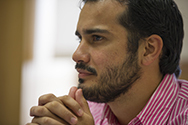Survey
Intellectual Virtue in Science Assessment

One important component of the Virtuous Scientist Project is to develop instruments to establish intellectual virtue specifically in scientists in training. These tools are being developed as much to encourage reflection and self-evaluation as for generating data about the disposition of scientists in training. Measuring any kind of habit or disposition is challenging because of the vagaries of self-reporting, especially with a character trait like intellectual virtue. However, arguments have been made that an assessment of intellectual virtue, despite the challenges, should still be attempted (see Kotzee [2016], Arthur et al. [2017]).

Meantime, there needs to be an assessment of what dispositions scientists start their education, or training with, in order to establish progress. Initially, our intent is to collect baseline data from multiple institutions, including the University of Notre Dame. However, the long-term goal is to develop tools with which to evaluate the development of intellectual virtue in scientists over many decades. This assessment would start during college and then go beyond graduation to when possessing intellectual virtue becomes especially critical in one's personal and professional life.
What is the intent of the survey?

Our survey will establish the ability of science students and faculty to identify and practice intellectual virtues in their education and research. The survey will also provide a tool for self-reflection and discussion about intellectual virtues. In addition, our intent is to establish whether with more instruction, reflection, and experience, the identification and practice of intellectual virtue is improved and becomes more consistent.

The survey will determine a participant's own disposition towards the ten master intellectual virtues. To do this, the survey will ask questions related to each master intellectual virtue and associated vices of excess and deficiency. From the answers to these questions we will triangulate whether an individual is able to both identify and practice a given intellectual virtue. Individual questions will establish either the frequency with which a given intellectual virtue is by a participant, or participants’ agreement with a statement about that intellectual virtue. Prior to taking the survey, participants will also be asked to self-identify whether they are involved in a significant amount of research. If they are involved in research, then participants will be asked frequency questions that directly assess the role of intellectual virtue in the student's experience of doing scientific research; this set of questions will be most appropriate for graduate students as well as upper-class undergraduate students engaged in research. Participants without significant research experience will be asked frequency questions about other academic experiences, such as the role of intellectual virtue in coursework; this set of questions will be most appropriate for lower-class undergraduate students with no research experience. Both groups will be asked the same agreement questions.
What assessment tools exist or are being developed?
There is a wealth of work in psychology about the theory and practice of assessing character. However, there is little with respect to assessing character specifically in the context of science education and training. Robert Pennock at Michigan State University and Jon Miller at University of Michigan have been surveying established scientists about the character of their colleagues as part of their Scientific Virtues Project. One conclusion of their project is that there are specific character traits that scientists do look for in others, many of which align with the master intellectual virtues that the Virtuous Scientist Project is using. There is also evidence that guided, structured reflection and discussion can help more broadly in character development.
Several institutions or projects have been developing instruments to evaluate intellectual virtue for different reasons and motivations:
· Development of Virtues in the Practice of Science Project
· Institute for the Study of Human Flourishing, University of Oklahoma
· Intellectual Virtues Academy of Long Beach
· Jubilee Center for Character and Virtues, University of Birmingham, UK
· The Scientific Virtues Project, Michigan State University
· VIA Institute on Character
Sources
Arthur, J., K. Kristjánsson, T. Harrison, W. Sanderse, and D. Wright. 2017. Chapter 7 How Can We Measure Virtue and Evaluate Programmes of Character Education? Pages 108-121 in Teaching Character and Virtue in Schools. Routledge, New York, NY.
Kotzee, B. 2016. Chapter 9: Problems of Assessment in Educating for Intellectual Virtue. Pages 142-160 in Jason Baehr (Ed.). Intellectual Virtues and Education: Essays in Applies Virtue Epistemology. Routledge, New York, NY.